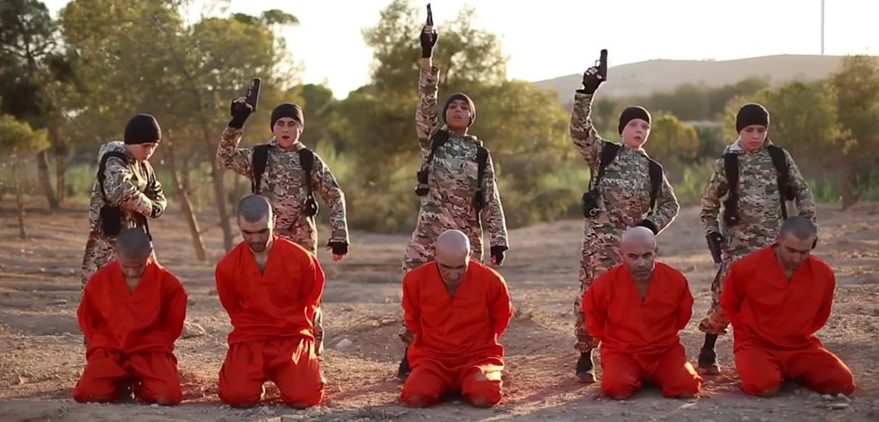Following on from last weeks post about Terrorist Propaganda Online. This post aims to identify the key reasons of why and how the youngest generation (Generation Z) are susceptible to Terrorist recruitment.
Vital Information
- Generation Z’s need for the internet puts them at risk of exposure to propaganda.
- Social Media allows Terrorists to have direct private conversations with minors.
- Terrorists are now using video games as a recruitment strategy to desensitise children from extreme violence.
- Children need to be properly educated about extremist propaganda.

Why is Generation Z Vulnerable?
Generation Z comprises of anyone born since just before the start of the Millennium. Meaning they are Young, Tech savvy and most importantly Impressionable. Generation Z doesn’t know a world without the internet. As a result, they are emerged in the online world relying on it daily to communicate via their smartphones, tablets or computers. On average Generation Z uses their smartphones 15.4 hours per week more than any other generation.
The consistent need to access the internet could be a danger, as this vulnerable generation are more likely to be exposed to terrorist propaganda. Direct communication can also be made by terrorists via messaging services on Facebook, Twitter, Snapchat, YouTube and more. From this terrorists can build a rapport with young online users. This could lead to terrorist ideologies and messages being pushed on impressionable youth. The aim is to radicalise minors from the comfort of their bedrooms.
In the eyes of terrorists, Generation Z are easy targets for recruitment. Not just because of their need for the internet but their lack of understanding about the real world. They are still developing and learning about where they fit into the world.
A recent Study showed 60% of Generation Z want to make a difference to the world. However, this could be a vulnerability as Terrorist may promote a lifestyle that misleads youth. They could be led to believe that joining groups such as ISIS could give them the change they want and to be given the responsibilities of an adult. In reality, they are being conscribed to commit horrific acts of destruction, or for females being led into a role where they are raped and abused.
Before we go any further, this could be affecting the people around you. It could be your children, siblings or maybe even you.
Recruitment on Social Media
Before social media and the internet, terrorists struggled to reach out to specific audiences in western countries. However, the introduction of social media offers terrorists great power in the form of communication. This development is negative as terrorists now have a global pool of potential recruits.
In 2013 a young woman from Glasgow, Aqsa Mahmood, ended up dropping out of university to travel to Syria to Join ISIS. She herself had been radicalised through the internet believing that moving to Syria would give her a better life.
Since her move, she has become prolific for spreading ISIS propaganda online. Her tweets call for other young British women to travel to the Islamic State. In a sense, she is acting like a puppet. Her age and online accounts are vital to source, even more, younger recruits. She can produce propaganda that would directly hit several minor’s newsfeeds and even directly message them.
Aqsa’s tweeting has proven effective. In 2015, 3 London based girls fled their home to join ISIS in Syria. Aqsa used Twitters direct messaging service to contact the girls and give them vital travel information.

Sara Khan, director at the anti-extremist group Inspire, states:
“Extremists target young girls and try to convince them to “come and join this wonderful family”.
Sadly, these young girls were fed this lie and ended up being influenced to join through social media. This was all done without their parents knowing. Thus showing the secrecy of social media and the danger children could put themselves in.
At this current time, Kadiza Sultana one of the 3 girls is thought to have been killed by an airstrike in Syria.
Twitter has shut down Aqsa Mahmood’s account although she could easily set up a new one which raises the same issues as the last post.
The Future of Social Media Recruitment
New research has shown Instagram and Snapchat are the leading social media platforms for Generation Z. 38% said they use Instagram the most whilst 28% spent more time on Snapchat.This data shows how the likes of Twitter and Facebook may not be the best way for Terrorists to recruit.
It would be interesting to see if Terrorists could push their propaganda on these platforms. However, access to minors Snapchat accounts may be limited as the platform is very private.
There is no search system built in which means for now Snapchat is a safe haven for Generation Z.
New Ways To Recruit
Social media isn’t the only way terrorists recruit minors online. New approaches have been taken in the form of Storytelling, Music videos and more importantly Video games. ISIS are creating propaganda that relates to Generation Z by keeping their attention. This is because Generation Z has an 8-second attention span.
An example of this is the game Grand Theft Auto 5 (GTA). The game is rated at 18+ but many minors play it.
The video above shows all in-game footage from GTA portraying so-called similarities to ISIS’ attacks. These include mass shootings and assassinations of police officers. Translating the message in the video states:
“Do the things you do in game in real life on the battlefield”.
This isn’t the only game. Free to play games allow minors to hunt down and kill prolific western figures such as former president George Bush.
The aim is to prey on vulnerable children. Essentially desensitising and dehumanising them from forms of extreme violence. So much so that they believe the messages in these games and becoming willing to join these groups as it will give them a purpose.

Though, it should be noted that this form of recruitment is sceptical. It may not be effective as only a small percentage of youths will become desensitised to violence.
What You Can Do
Finally, there are options here to limit exposure. You could block accounts on social media or even try to set up child security on your computer.
However, if you do have children it is recommended that you be proactive, insightful and talk to them about extremist content. This generation needs to be properly educated about Terrorist propaganda online before its too late. More information can be found here.
In Conclusion, the risk of children becoming Radicalised may be low however Exposure to propaganda is still extremely high.
Thanks for reading.
Next week’s topic will investigate how recruited terrorists are facilitating attacks online.
Leave a Reply